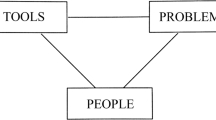Abstract
The concept of active knowledge implementation on the basis of the theory of structural program synthesis, modern technologies and their necessary developments are considered. The theory is proposed for technological description, accumulation, keeping, processing and application of active knowledge. On this basis the notion of literacy for the future is suggested. The concept was implemented in the frame of the LuNA project aimed at elimination of parallel programming from the process of large-scale numerical models development.
LITERACY is the capability of a human being to describe, to keep, to understand and to apply the knowledge.
Access this chapter
Tax calculation will be finalised at checkout
Purchases are for personal use only
Similar content being viewed by others
Notes
- 1.
The term technological is used in order to denote that a specified object (theory, model, problem, algorithm, program, etc.) can be implemented for practically acceptable time and with necessary properties, with the use of acceptable number of resources.
- 2.
The term acceptable is used in order to denote that a specified solution, quality, program, resources allocation, etc., can be used in practice because, for example, better solution doesn’t exist or is not known now.
References
Zadykhailo, I.B.: Sostavlenie tsiklov po parametricheskim zapisyam spetsialnogo vida. Zhurnal vychislitelnoi mathematiki i mathematicheskoi physiki 3(2), 337–357 (1963). (in Russian)
Manna, Z., Waldinger, R.: Synthesis: dreams -\(>\) programs. IEEE Trans. SE SE–5, 294–398 (1979)
Ershov, Y.L., Goncharov, S.S., Sviridenko, D.I.: Semantic programming. Information Processing: Proceedings of IFIP 10th World Computer Congress Series, vol. 10, Amsterdam, pp. 1113–1120 (1986)
Giannesini, F., Kanoui, H., Pasero, R., Caneghem, M.: Prolog. International Computer Science Series. Addison-Wesley, Wokingham (1986)
Genesereth, M.R., Nilsson, N.J.: Logical Foundation of Artificial Intelligence. Morgan Kaufmann, Los Altos (1987)
Valkovskii, V.A., Malyshkin, V.E.: Synthesis of Parallel Programs and Systems on the Basis of Computational Models, Nauka, Novosibirsk, p. 128 (1988). (in Russian, Sintez parallelnykh programm i sistem na vychislitelnykh modelyakh)
Andrianov, A.N., Efimkin, K.N., Zadykhailo, I.B.: Nonprocedural language for mathematical physics. Program. Comput. Softw. 17(2), 10–22 (1992)
Andrianov, A.N., Efimkin, K.N., Levashov, V.Y., Shishkova, I.N.: The NORMA language application to solution of strong nonequilibrium transfer processes problem with condensation of mixtures on the multiprocessor system. In: Dongarra, J., Alexandrov, V.N., Tan, C.J.K., Juliano, B.A., Renner, R.S. (eds.) ICCS-ComputSci 2001. LNCS, vol. 2073, pp. 502–510. Springer, Heidelberg (2001)
Malyshkin, V.: Assembling of parallel programs for large scale numerical modeling. In: Handbook of Research on Scalable Computing Technologies, Chap. 13, pp. 295–311. IGI Global, USA (2010)
Kraeva, M.A., Malyshkin, V.E.: Assembly technology for parallel realization of numerical models on MIMD-multicomputers. Future Gener. Comput. Syst. Elsevier Sci. 17(6), 755–765 (2001)
Kireev, S., Malyshkin, V.: Fragmentation of numerical algorithms for parallel subroutines library. J. Supercomputing 57(2), 161–171 (2011)
Bosilca, G., Bouteiller, A., Danalis, A., Faverge, M., Haidar, A., Herault, T., Kurzak, J., Langou, J., Lemarinier, P., Ltaeif, H., Luszczek, P., YarKhan, A., Dongarra, J.: Flexible development of dense linear algebra algorithms on massively parallel architectures with DPLASMA. In: Proceedings of the Workshops of the 25th IEEE International Symposium on Parallel and Distributed Processing, Anchorage, Alaska, USA, pp. 1432–1441. IEEE (2011)
Malyshkin, V.: How to create the magic wand. Currently implementable formulation of the problem. In: The Proceedings of the 5-th SoMeT International Conference on New Trends in Software Methodologies, Tools and Techniques, vol. 147, pp. 127–132. IOS Press, Quebec, 28–30 September 2006
Malyshkin, V.: Two approaches to program synthesis or implementation of partially defined theories. In: Proceedings of the 11th International Conference on New Trends in Software Methodologies, Tools and Techniques, vol. 246, pp. 285–291. IOS Press, USA (2012)
Malyshkin, V.E., Perepelkin, V.A.: The PIC implementation in LuNA system of fragmented programming. J. Supercomputing 69(1), 89–97 (2014). Springer
Kireev, S.: A parallel 3D code for simulation of self-gravitating gas-dust systems. In: Malyshkin, V. (ed.) PaCT 2009. LNCS, vol. 5698, pp. 406–413. Springer, Heidelberg (2009)
Kleene, S.C.: Introduction to Metamathematics. Princeton University Press, Princeton (1952)
Author information
Authors and Affiliations
Corresponding author
Editor information
Editors and Affiliations
Rights and permissions
Copyright information
© 2015 Springer International Publishing Switzerland
About this chapter
Cite this chapter
Malyshkin, V. (2015). Active Knowledge, LuNA and Literacy for Oncoming Centuries. In: Bodei, C., Ferrari, G., Priami, C. (eds) Programming Languages with Applications to Biology and Security. Lecture Notes in Computer Science(), vol 9465. Springer, Cham. https://doi.org/10.1007/978-3-319-25527-9_19
Download citation
DOI: https://doi.org/10.1007/978-3-319-25527-9_19
Published:
Publisher Name: Springer, Cham
Print ISBN: 978-3-319-25526-2
Online ISBN: 978-3-319-25527-9
eBook Packages: Computer ScienceComputer Science (R0)




